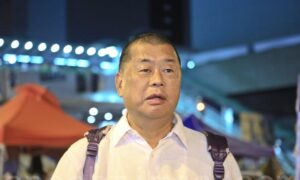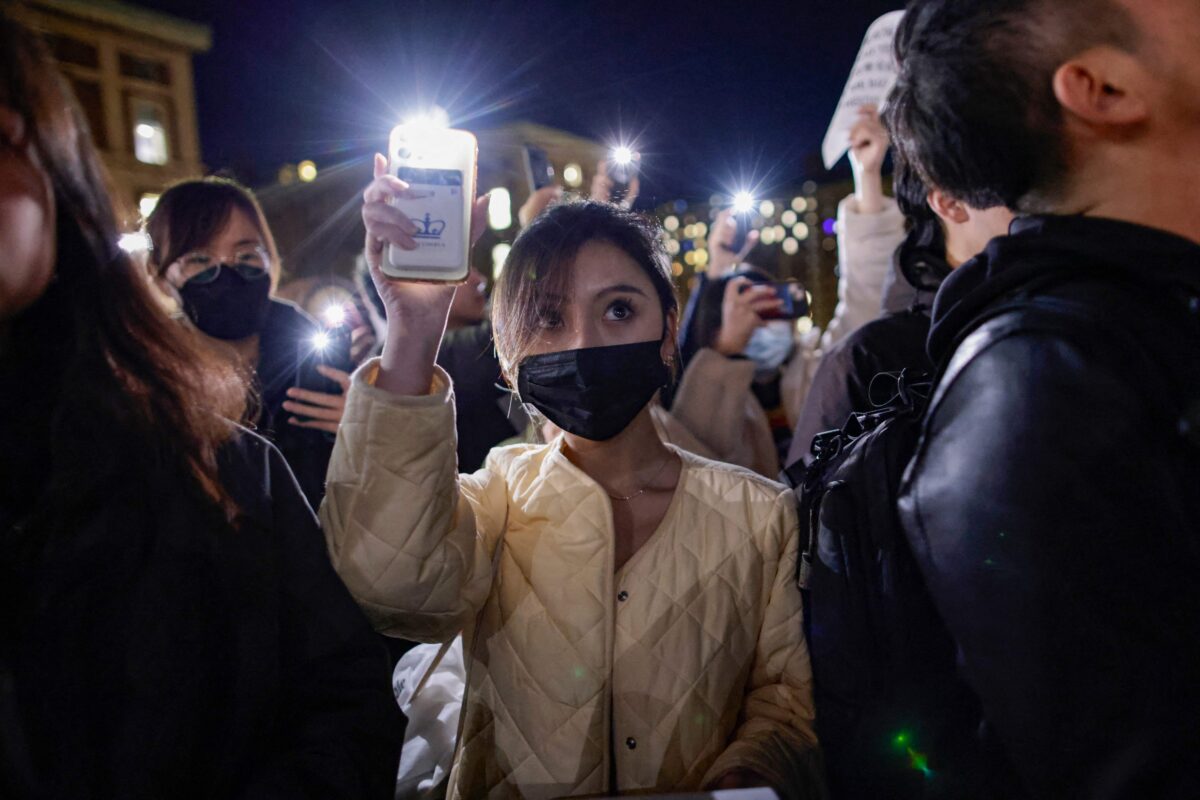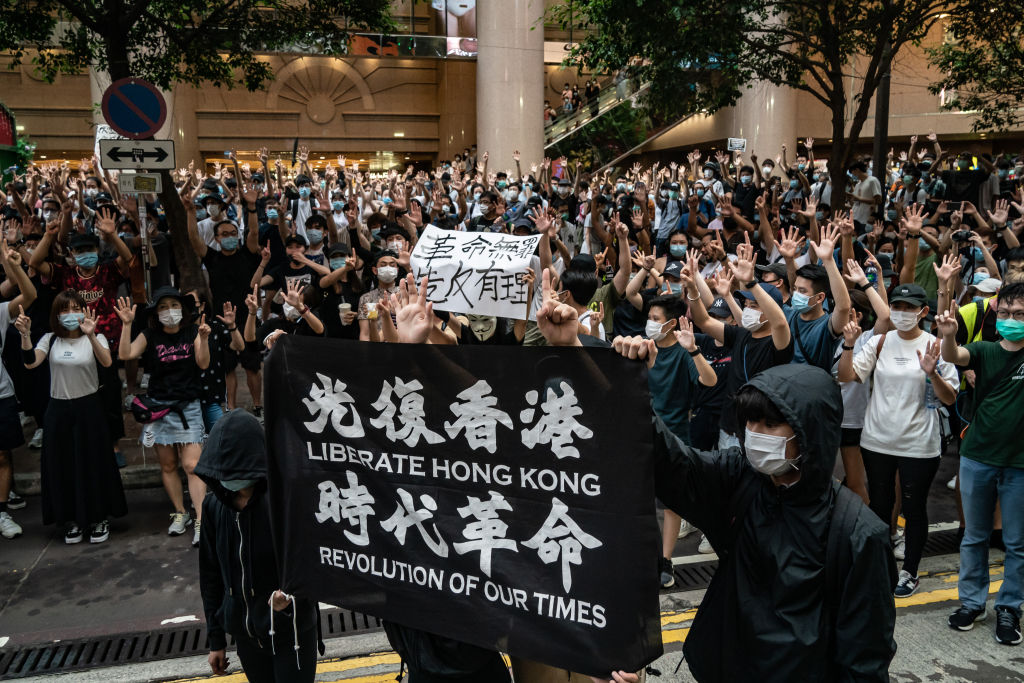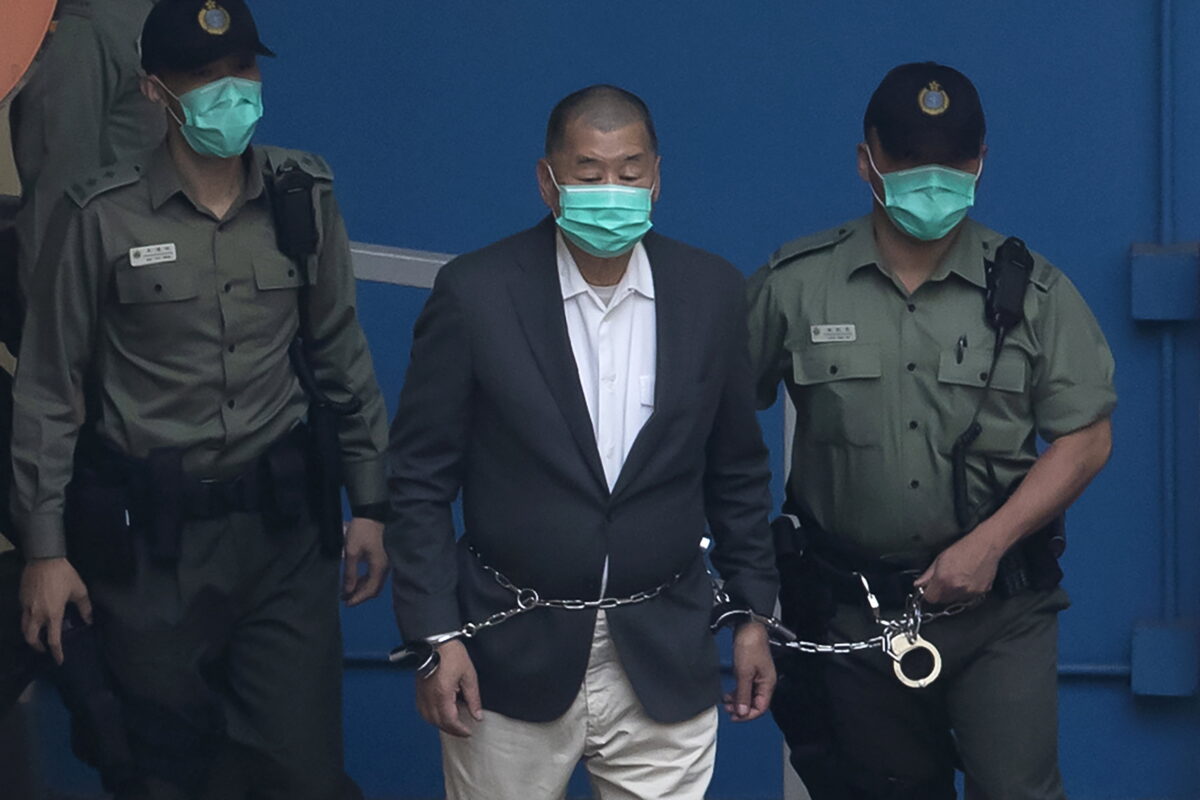Jimmy Lai Documentary ‘The Hong Konger’ Aims to Advance Mass Protests Against CCP Rule
Nothing better exemplifies the Chinese people’s quest for freedom and democracy than the effort to free entrepreneur, publisher, and dissident Jimmy Lai, an outspoken foe of political repression who has languished in a Hong Kong jail almost continuously since August 2020.That’s the view of Fr. Robert Sirico, co-founder and president emeritus of the Acton Institute, a Michigan-based conservative think tank, which has produced a 73-minute documentary titled “The Hong Konger.” Lai was jailed for his alleged violations of the city’s laws including the draconian national security law, a measure that was imposed in June 2020 and enables the Chinese Communist Party (CCP) to lock people up on the grounds of broad and ill-defined offenses including subversion and sedition. The documentary tells the story of Lai’s life and times, from his migration from China to Hong Kong to his launch of the designer Giordano clothing brand to his founding of the Apple Daily newspaper and his numerous activities on behalf of Hong Kong’s autonomy and the anti-CCP, pro-democratic movement in the territory and mainland China. In April 2021, Lai received a sentence of 14 months in prison for having allegedly organized illegal protests, and then in December of that year, authorities slapped on an additional 13 months for Lai’s role in a Tiananmen candlelight vigil. The documentary also has much to impart about Britain’s ceding of Hong Kong to the communist regime in 1997, the brief liberalizations undertaken after the death of CCP’s first leader Mao Zedong, the crackdowns on dissent culminating in the atrocities of Tiananmen Square, and the more recent grassroots opposition to authoritarianism whose latest expression can be seen in the widespread public protests of Beijing’s harsh lockdowns. A woman holds up her phone with the flashlight on as people gather at Columbia University during a protest in support of demonstrations held in China calling for an end to COVID-19 lockdowns, in New York on Nov. 28, 2022. (Kena Betancur/AFP via Getty Images) No Isolated Case According to Sirico, the anti-lockdown and anti-authoritarian protests that have rocked Chinese cities and made headlines around the world in recent weeks are about far more than just opposition to Beijing’s COVID-19 policies. They are similar in spirit to the pro-democratic ferment seen in China in the lead-up to the Tiananmen Square crackdown of June 1989, he said, and other dynamic and tumultuous periods not only in China but in the histories of other nations where citizens have sought to overthrow autocracy. “What we’ve seen going on as the result of the draconian lockdowns is only the tip of the iceberg. Instantly, those protests turned into something much bigger,” Sirico told The Epoch Times. Sirico sees parallels between the current unrest and other epochal moments in China’s history, not to mention movements for liberalization elsewhere in the world, such as the Arab Spring. “What’s happening now is not only an analog to what went on in China in the 1980s [in the lead-up to Tiananmen Square], but to what went on in the Arab world, which was sparked by a fruit vendor who immolated himself. There’s a shared DNA in all this. It’s called the human quest to be free,” Sirico said. In an interview with The Epoch Times, Sirico described how he grew increasingly intrigued with Lai and his story after meeting Lai on a trip to Hong Kong in 1997, where he also met with William McGurn, then a senior editor of the Far Eastern Economic Review, who features prominently in the documentary. From the beginning, it was evident to Sirico and others that virtually all of Lai’s activities posed risks given the state of economic and political freedoms in China and Hong Kong. “We knew, and Jimmy knew, that he was poking the bear in everything he did, in his clothing business and the newspaper and community businesses that he built. He knew there was a threat, but he loved China. He could have left at any point, but he made a very clear decision to make a moral statement for freedom, not just for himself but for the Chinese people,” Sirico told The Epoch Times. Demonstrators take part in a protest against the new national security law in Hong Kong on July 1, 2020. (Anthony Kwan/Getty Images) Sirico was candid about the results that he hopes telling Lai’s story, and that of the democratic movement, through the documentary will achieve. “When our team sat down to do this, I was asked, ‘What do you want this to accomplish?’ And I said I want it to accelerate the end of the rule of the CCP. And of course everybody laughed, but I think if you don’t shoot for the stars, you don’t get to the moon,” Sirico reflected. “I’m hoping that this film, if it can get in, can begin to spark some ideas,” he added. Sirico emphasized the impossibility of separating the challenges that Lai has faced, in his entrepreneurship and his media activities, with the struggle of people, movements, and organiz

Nothing better exemplifies the Chinese people’s quest for freedom and democracy than the effort to free entrepreneur, publisher, and dissident Jimmy Lai, an outspoken foe of political repression who has languished in a Hong Kong jail almost continuously since August 2020.
That’s the view of Fr. Robert Sirico, co-founder and president emeritus of the Acton Institute, a Michigan-based conservative think tank, which has produced a 73-minute documentary titled “The Hong Konger.”
Lai was jailed for his alleged violations of the city’s laws including the draconian national security law, a measure that was imposed in June 2020 and enables the Chinese Communist Party (CCP) to lock people up on the grounds of broad and ill-defined offenses including subversion and sedition.
The documentary tells the story of Lai’s life and times, from his migration from China to Hong Kong to his launch of the designer Giordano clothing brand to his founding of the Apple Daily newspaper and his numerous activities on behalf of Hong Kong’s autonomy and the anti-CCP, pro-democratic movement in the territory and mainland China.
In April 2021, Lai received a sentence of 14 months in prison for having allegedly organized illegal protests, and then in December of that year, authorities slapped on an additional 13 months for Lai’s role in a Tiananmen candlelight vigil.
The documentary also has much to impart about Britain’s ceding of Hong Kong to the communist regime in 1997, the brief liberalizations undertaken after the death of CCP’s first leader Mao Zedong, the crackdowns on dissent culminating in the atrocities of Tiananmen Square, and the more recent grassroots opposition to authoritarianism whose latest expression can be seen in the widespread public protests of Beijing’s harsh lockdowns.
 A woman holds up her phone with the flashlight on as people gather at Columbia University during a protest in support of demonstrations held in China calling for an end to COVID-19 lockdowns, in New York on Nov. 28, 2022. (Kena Betancur/AFP via Getty Images)
A woman holds up her phone with the flashlight on as people gather at Columbia University during a protest in support of demonstrations held in China calling for an end to COVID-19 lockdowns, in New York on Nov. 28, 2022. (Kena Betancur/AFP via Getty Images)
No Isolated Case
According to Sirico, the anti-lockdown and anti-authoritarian protests that have rocked Chinese cities and made headlines around the world in recent weeks are about far more than just opposition to Beijing’s COVID-19 policies. They are similar in spirit to the pro-democratic ferment seen in China in the lead-up to the Tiananmen Square crackdown of June 1989, he said, and other dynamic and tumultuous periods not only in China but in the histories of other nations where citizens have sought to overthrow autocracy.
“What we’ve seen going on as the result of the draconian lockdowns is only the tip of the iceberg. Instantly, those protests turned into something much bigger,” Sirico told The Epoch Times.
Sirico sees parallels between the current unrest and other epochal moments in China’s history, not to mention movements for liberalization elsewhere in the world, such as the Arab Spring.
“What’s happening now is not only an analog to what went on in China in the 1980s [in the lead-up to Tiananmen Square], but to what went on in the Arab world, which was sparked by a fruit vendor who immolated himself. There’s a shared DNA in all this. It’s called the human quest to be free,” Sirico said.
In an interview with The Epoch Times, Sirico described how he grew increasingly intrigued with Lai and his story after meeting Lai on a trip to Hong Kong in 1997, where he also met with William McGurn, then a senior editor of the Far Eastern Economic Review, who features prominently in the documentary. From the beginning, it was evident to Sirico and others that virtually all of Lai’s activities posed risks given the state of economic and political freedoms in China and Hong Kong.
“We knew, and Jimmy knew, that he was poking the bear in everything he did, in his clothing business and the newspaper and community businesses that he built. He knew there was a threat, but he loved China. He could have left at any point, but he made a very clear decision to make a moral statement for freedom, not just for himself but for the Chinese people,” Sirico told The Epoch Times.
 Demonstrators take part in a protest against the new national security law in Hong Kong on July 1, 2020. (Anthony Kwan/Getty Images)
Demonstrators take part in a protest against the new national security law in Hong Kong on July 1, 2020. (Anthony Kwan/Getty Images)
Sirico was candid about the results that he hopes telling Lai’s story, and that of the democratic movement, through the documentary will achieve.
“When our team sat down to do this, I was asked, ‘What do you want this to accomplish?’ And I said I want it to accelerate the end of the rule of the CCP. And of course everybody laughed, but I think if you don’t shoot for the stars, you don’t get to the moon,” Sirico reflected.
“I’m hoping that this film, if it can get in, can begin to spark some ideas,” he added.
Sirico emphasized the impossibility of separating the challenges that Lai has faced, in his entrepreneurship and his media activities, with the struggle of people, movements, and organizations everywhere opposed to the CCP.
“I think this is part of that story—people wanting to be free, whether it has to do with COVID unrest, or the Uyghurs, or the entrepreneurs who want freedom, or people who want to protest on the street or write articles,” Sirico said.
An Ambitious Project
What began as a personal statement of friendship for Lai grew into a cinematic project enjoying the support of friends of the Acton Institute as well as a run at prominent film festivals. But Sirico and others have still higher ambitions for The Hong Konger. That they have not yet realized these plans is partly a consequence of the lack of media freedom in Hong Kong, whether the medium in question is cinema experienced the traditional way or through streaming, he said.
“We’re coming to the end of the film festival phase. So it has not been publicly released yet, though there have been showings for invitees. I know that a number of people in Hong Kong have seen this film, and they want greater access but, of course, the whole internet issue is difficult over there,” Sinico continued.
The regime in Beijing is not oblivious to the existence of the documentary or the efforts of Sirico and the Acton Institute to promote it. Not only has Sirico seen evidence of high-level communications within the regime concerning the documentary, but the servers of the Acton Institute have come under attack from bad actors that he and his colleagues believe are linked to the regime.
When Sirico and colleagues organized a showing of the documentary on Capitol Hill, he received advance word that “several agents” of the Chinese regime would be in attendance, and made the decision to welcome them, he said.
“I said, Jimmy Lai’s freedom is your freedom, and even the police on the street [in China] need to know that this their freedom” that Lai and the documentary champion, Sirico added.
 Hong Kong media mogul and pro-democracy activist Jimmy Lai, is escorted by Correctional Services officers to get on a prison van before appearing in a court in Hong Kong, Dec. 12, 2020. (Kin Cheung/AP Photo)
Hong Kong media mogul and pro-democracy activist Jimmy Lai, is escorted by Correctional Services officers to get on a prison van before appearing in a court in Hong Kong, Dec. 12, 2020. (Kin Cheung/AP Photo)
Struggles to Come
For all its success on the film festival circuit and in private screenings, those who want masses of people to see The Hong Konger and absorb its message have an uphill road ahead.
“In Hong Kong, it’s suppressed, and if you smuggle a file [into the territory], that creates problems for anybody doing that. My understanding is that the national security kaw has changed everything,” Sirico said.
Sirico’s comment points to one of the themes of the documentary, which illustrates how economic and political rights and liberties have waxed and waned at different junctures of China’s modern and contemporary history. The fiscal liberalizations undertaken by CCP leader Deng Xiaoping after the death of Mao did not presage a freer China, but in fact, were succeeded by an era of ever-tightening dictatorial control, repression of dissent, territorial aggression, and well-documented genocide against the Uyghur minority, all under the rule of Xi Jinping.
Communist officials have made use of the national security law to launch repeated raids on the offices of Apple Daily, confiscating notebooks, cell phones, and computer files and shutting down the Twitter account and the bank accounts of the publication. Amid this targeting, the newspaper was forced to shut down in June 2021.
At a point close to the one-hour mark in the documentary, Lai, speaking before his incarceration, himself acknowledges that his prosecution under the national security law is all but a foregone conclusion, given its vagueness and its use as a tool of political repression. But he says that on one level, he welcomes the trouble that his activities on behalf of free speech and political liberties have stirred up.
“It’s almost certain that they will put me in jail. It would be so boring just being a businessman. I want to make my life more meaningful and interesting. That’s why I got into the trouble that I’m in today, and I’m happy, to be honest,” Lai says.







